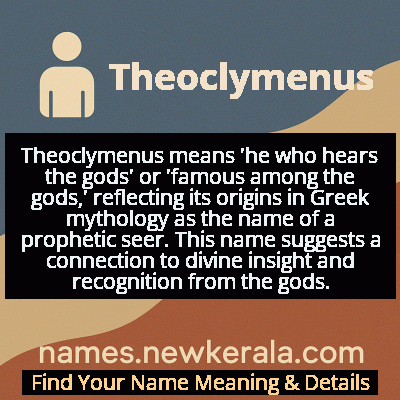Theoclymenus Name Meaning & Details
Origin, Popularity, Numerology Analysis & Name Meaning of Theoclymenus
Discover the origin, meaning, and cultural significance of the name THEOCLYMENUS. Delve into its historical roots and explore the lasting impact it has had on communities and traditions.
Name
Theoclymenus
Gender
Male
Origin
Greek
Lucky Number
7
Meaning of the Name - Theoclymenus
Theoclymenus means 'he who hears the gods' or 'famous among the gods,' reflecting its origins in Greek mythology as the name of a prophetic seer. This name suggests a connection to divine insight and recognition from the gods.
Theoclymenus - Complete Numerology Analysis
Your Numerology Number
Based on Pythagorean Numerology System
Ruling Planet
Neptune (Ketu)
Positive Nature
Intuitive, analytical, spiritual, and inquisitive.
Negative Traits
Secretive, reserved, aloof, and can be overly critical.
Lucky Colours
Green, yellow.
Lucky Days
Monday.
Lucky Stones
Cat’s eye, moonstone.
Harmony Numbers
1, 5, 6.
Best Suited Professions
Scientists, researchers, spiritual leaders, detectives.
What People Like About You
Depth of knowledge, analytical skills, spirituality.
Famous People Named Theoclymenus
Theoclymenus of Sparta
Mythical King
Son of Proteus, king of Egypt in Homer's Odyssey who wanted to marry Helen of Troy
Theoclymenus the Seer
Prophet
Descendant of Melampus, gifted with prophetic visions who foretold the suitors' doom in the Odyssey
Theoclymenus of Athens
Tragic Playwright
Ancient Greek tragedian mentioned by Aristophanes, though his works are lost to history
Name Variations & International Equivalents
Click on blue names to explore their detailed meanings. Gray names with will be available soon.
Cultural & Historical Significance
The name's meaning—'famous among the gods' or 'he who hears the gods'—reflects the Greek worldview where human achievement and recognition were often tied to divine favor and supernatural abilities. In broader classical culture, Theoclymenus represents the archetype of the exiled noble who maintains his dignity and special gifts despite misfortune. This theme resonated throughout Greek literature and philosophy, emphasizing that true worth comes from character and abilities rather than circumstances. The preservation of his story across millennia speaks to the enduring human fascination with prophecy, destiny, and the mysterious ways the divine interacts with the mortal world.
Extended Personality Analysis
Individuals named Theoclymenus are typically perceived as possessing deep intuition and spiritual awareness, reflecting the prophetic nature of their mythological namesake. They often demonstrate keen observational skills and the ability to perceive underlying patterns and truths that others might miss. This intuitive nature is complemented by a strong sense of loyalty and gratitude, as seen in the original Theoclymenus's devotion to Telemachus who protected him. They tend to be thoughtful, contemplative individuals who value wisdom over immediate action, often serving as advisors or guides to others.
Their connection to the mythological seer suggests a personality that balances practical reality with spiritual insight, making them both grounded and visionary. While they may appear reserved or mysterious to others, this often stems from their depth of perception and the weight of understanding they carry. Theoclymenus-types are typically patient and methodical, preferring to observe and analyze before acting. They possess a natural authority that comes not from aggression but from genuine wisdom and insight. However, they may struggle with the burden of their perceptions, sometimes feeling isolated by knowledge others cannot share or understand. Their greatest strength lies in their ability to see beyond surface appearances to deeper truths, making them invaluable counselors and truth-seekers.
Modern Usage & Popularity
The name Theoclymenus remains extremely rare in modern times, primarily used in academic or classical contexts rather than for contemporary naming. Its usage is almost exclusively limited to Greece and among classical scholars or families with strong connections to Greek heritage and mythology. The name has never appeared in popular baby name rankings and maintains an archaic, scholarly character. In modern Greek society, it might be chosen by parents seeking a distinctly classical name with deep mythological roots, but it faces competition from more accessible ancient names like Aristotle, Odysseus, or Alexander. The complexity and length of the name also contribute to its limited modern appeal, though it occasionally appears in literary works or historical fiction as a character name. There are no significant popularity trends to note, as the name has remained consistently uncommon throughout modern history, serving more as a cultural artifact than a living naming tradition.
Symbolic & Spiritual Meanings
Theoclymenus symbolizes the bridge between mortal and divine realms, representing the human capacity to receive and interpret divine messages. As a prophetic figure, the name embodies foresight, wisdom, and the understanding of fate's intricate patterns. It carries connotations of spiritual insight and the responsibility that comes with special knowledge. The name also symbolizes protection and sanctuary, recalling how Theoclymenus found safety with Telemachus, representing the sacred bond between protector and protected. Additionally, it signifies the tension between free will and predestination that was central to Greek philosophical thought, serving as a reminder that while fate may be written, human actions and choices remain crucial in determining outcomes. The name represents the idea that true understanding often comes through suffering and exile, as Theoclymenus was a fugitive when he demonstrated his prophetic gifts, suggesting that wisdom is often born from adversity and displacement.

